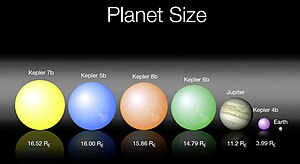NASA: Kepler telescope discovers strange new planet | The State Column
 Image via Wikipedia
Image via Wikipedia Image via Wikipedia
Image via Wikipedia Image via Wikipedia
Image via Wikipedia"NASA will reveal the latest batch of discoveries made by its planet-hunting Kepler space telescope on Monday, according to a statement released by the space agency. NASA says it will hold a press conference at its Ames Research Center in Moffett Field, California. The press conference is the first of the inaugural Kepler Science Conference, which will focus on findings made by the Kepler telescope. The conference will run from December 5 to December 9 and will feature more than 110 scientific presentations, officials said."
Read more: http://www.thestatecolumn.com/science/kepler-discover-strange-new-planet/#ixzz1fYXoYHyK
..
.ero
.
The exoplanet, which is known as Kepler-21b, is just 1.6 times bigger than earth, making it a so-called “super Earth.” However, the planet orbits so close to its parent star that astronomers say its surface temperature to be about 2,960 degrees Fahrenheit.
The planet reportedly orbits at a distance of six million km – nearly ten times closer than Mercury orbits the sun. The parent star, HD 179070, a little hotter and brighter than the sun, is 352 light years away. Somewhat similar to the sun, the parent star is 2.84 billion years- younger than the sun’s 4.6 billion years. Although Kepler-21b is pretty small and very far away, unable to be seen with the naked eye, the parent star can easily be seen with binoculars or a small telescope.
While the planet is considered super-Earth, NASA scientists emphasize that a super-Earth does not mean it is Earth-like. They say the newly-found super-Earth is heavy and dense, with a mass no more than 10 times that of the Earth. Space agency officials say the task took 65 scientists 15 months and that the multiple precision measurements and other readings taken by Kepler and the Kitt Peak telescopes made such a sensitive planet detection possible.
Read more: http://www.thestatecolumn.com/science/kepler-discover-strange-new-planet/#ixzz1fYXoYHyK
..
.ero
.

Comments
Post a Comment